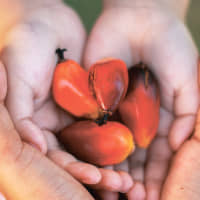As a tree-crop suited to cultivation in climatic conditions, similar to those of tropical rain forests, the oil palm is one of the planet’s most versatile super-oil producing crops.
Despite deforestation fears fueled by various nongovernmental organization campaigns, Malaysia and Indonesia produce 85 percent of the planet’s palm oil — the former of which is at the forefront of efforts to drive sustainable practices. In terms of consumption, palm oil has been proven to be as healthy as other commonly consumed oils, and it offers a range of commercial applications ranging from food, emulsifiers, food conditioners,
soaps, detergents, foaming agents, cosmetics and fuel.
Organizations such as the United States Department of Agriculture have encouraged food manufacturers to substitute partially hydrogenated transfats, and the most viable substitute to date is still palm oil.
A rich history
Versatile and with a high smoke point, palm oil was once used as an alternative to tallow and lard, the animal-based traditional frying fats that were used in the production of soap, shampoo and other products. In line with consumers demanding more natural ingredients, palm oil production levels have increased gradually and spread to all parts of the world.
From 15.2 million metric tons in 1995 to 62.6 million metric tons in 2015, annual palm oil production has quadrupled. By 2050, production is expected to reach 240 million metric tons.
“Our goal is to educate farmers and consumers on sustainable oil palm cultivation and palm oil usage,” said Kalyana Sundram, CEO of the Malaysian Palm Oil Council (MPOC).
“Current sustainability efforts are targeting a variety of final consumer products. We track agricultural techniques and production output through customer products, raise awareness, and implement sustainable practices to support the industry.”
Companies have shifted to palm oil as a healthier oil alternative and today, approximately 60 percent of personal care products contain palm oil derivatives.
The food and consumer industries account for two-thirds of palm oil production, while one-third is used in biofuels and sustainable energy.
While Malaysia is successfully researching palm oil usage for biofuel solutions, innovative farming and plantation methods are expected to offset deforestation. Reduced costs and cultivation periods combined with optimum water usage and management, make palm oil a viable alternative to annual oil seed crops such as rapeseed, soy and sunflower.
The Malaysian palm oil industry is encouraging sustainable practices across the entire production process, from farmer to end users. To address concerns regarding deforestation, Malaysia’s Minister of Primary Industries, Teresa Kok, who is also in charge of the palm oil industry, has proposed not to add new plantations onto newly deforested areas. She advocates eventually capping the total cultivated area in Malaysia to ensure no further deforestation takes place. This should thwart any claims from various anti-palm oil sectors.
Malaysian palm oil products are certified for the 2020 Tokyo Olympic Games. As an Olympic partner, Malaysia is on track to deliver sustainably certified palm oil consistent with Japan’s high food safety standards.
With education and proper practices, there is much to be excited about in terms of the future of Malaysian palm oil production. Importantly, for those working in the Malaysian palm oil industry, education, income and living standards have dramatically improved. In a bold move, Malaysian Prime Minister Mahathir Mohamad officially launched the Love MY Palm Oil campaign to educate the nation’s consumers about all things palm oil.
MPOC is addressing opponents of the industry and driving sustainable solutions, while simultaneously reducing the negative impacts of farming and delivering palm oil to the world.



